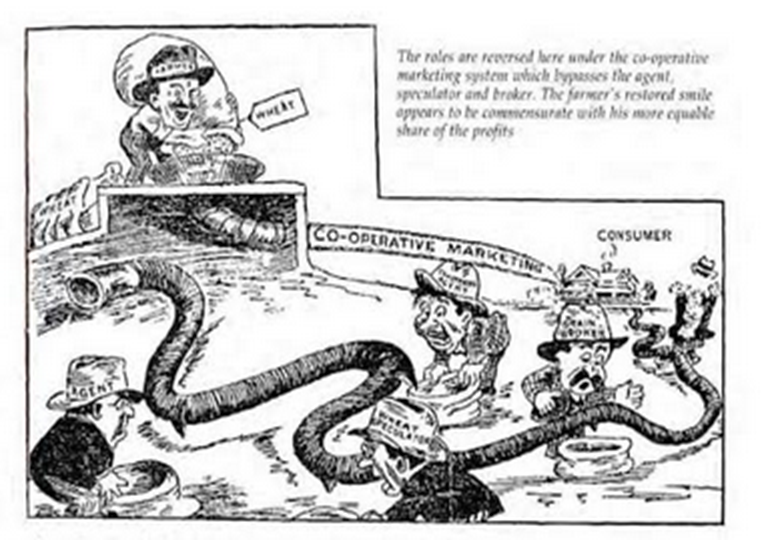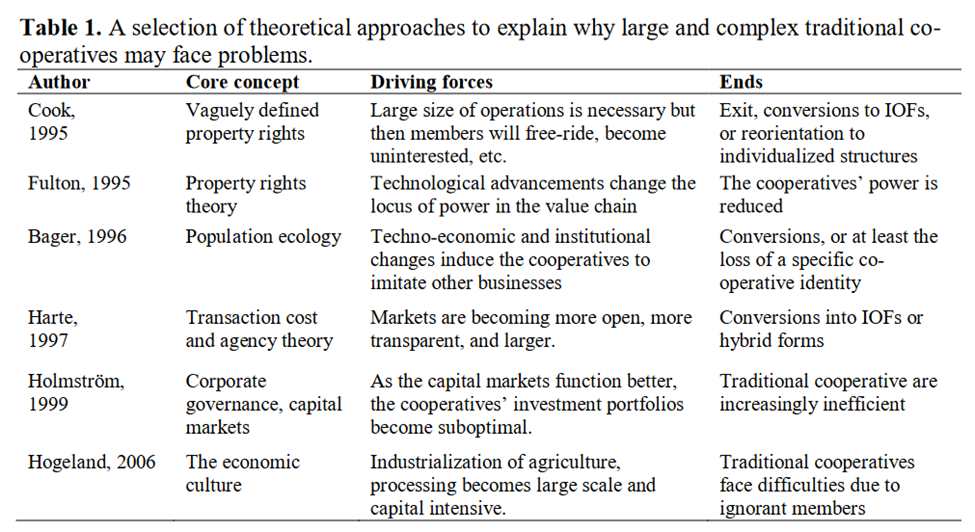Western Perspectives on a Nation: https://webarchive.slwa.wa.gov.au/wepon/land/html/wheat.htmt
According to the International Cooperative Alliance (ICA) a cooperative is defined in the Statement on the Cooperative Identity as an autonomous association of persons united voluntarily to meet their common economic, social and cultural needs and aspirations through a jointly owned and democratically controlled enterprise. The ICA is the global steward of the Statement on the Cooperative Identity – the Values and Principles of the cooperative movement. The ICA is one of the largest non-governmental organisations in the world today by the number of people it represents: more than 1 billion cooperative members from any of the 3 million cooperatives worldwide.
You can also consult the Guidance Notes on the Cooperative Principles and Values which give detailed guidance and advice on the practical application of the Principles to the cooperative enterprises from the following ICA Website: https://www.ica.coop/en/cooperatives/what-is-a-cooperative Definition of a cooperative and its fundamental principles is essential to distinguishing cooperatives from all other types of business organization. It must clearly and unambiguously characterize the differences between cooperatives and other business forms to ensure full understanding of the rights. responsibilities, and expectations of all parties involved with a cooperative. including the cooperatives’ users, directors, employees, and the general public. Reference: Basic Cooperative Principles and Their Relationship to Selected Practices JohnR.Dunn. J OURNAL OF AGRICULTURAL C OOPERATION 3 J. AGRIC. C OOPERATION 83 (1986) http://nationalaglawcenter.org/wp-content/uploads/assets/bibarticles/dunn_basic.pdf The Business Council of Co-operatives and Mutuals (BCCM) is the national peak body for co-operatives and mutuals in Australia. F U T U R E P R O O F I N G A U SS I E FA R M E R S: About the Co-operative Farming Project: Co-operative Farming will raise awareness about how co-operatives support farmers and fishers and agricultural industries. The program will provide education, information and support for the formation of co-operatives in farming, fishing and forestry. The project includes information sessions in regional centres across all states and territories to raise awareness about how farmers, fishers and foresters can use co-operative business models to be more resilient and profitable agricultural producers. To make sure farmers and fishers have access to the best advice, skills and information on starting up and running successful co-operatives, we want to increase access to the knowledge of co-operative experts through a dedicated mentorship program and the development of legacy educational resources. Co-operative Farming is supported by the Department of Agriculture, Water and the Environment through funding from the Australian Government’s Starting Farm Co-operatives Program. Reference: Co-operative Farming: Blueprint for future proofing Aussie farmers 2020. https://bccm.coop/wp-content/uploads/2020/09/BCCM-Co-operative-Farming-Blueprint.pdf
Characteristics of Membership in Agricultural Cooperatives.
Ollila, Jerker Nilsson and Claudia von Brömssen, Characteristics of Membership in Agricultural Cooperatives. Paper for the International Conference “Cooperative Responses and Global Challenges”, held in Berlin, Germany, on March 21-23, 2012. https://helda.helsinki.fi/bitstream/handle/10138/39239/ollila.pdf?sequence=2
The Importance of Cooperatives’ Corporate Social Responsibility to the Loyalty of Members.
Because of the ownership structure of cooperatives, the allocation of property rights in these organizations and other characteristics of cooperatives, the study of management mechanisms in the relationship between cooperatives and their members becomes relevant, in economic terms, as these companies struggle to maintain the loyalty of their members. The present study was undertaken to determine the effect of social responsibility activities on the loyalty of the members. In other words, we investigate whether the number of associates who conduct business with the cooperative (member’s loyalty) increases if the cooperative develops social responsibility activities. The results indicate, first, that use of special purpose reserves for technical, educational and social assistance programs and spending on education and the environment have no significant effect on the loyalty of the cooperative’s members. Second, the members’ loyalty increases if the cooperative has a greater capacity to provide services and generate higher returns for its members.
Ref: Bortoleto, Fabiana Cherubim; Rogerio de Moura Costa, Davi, The Importance of Cooperatives’ Corporate Social Responsibility to the Loyalty of Members. 2012. Journal Of Rural Cooperation, 40(2) 2012: 198–216. https://ageconsearch.umn.edu/record/249596/
Are Traditional Cooperatives an Endangered species? About Shrinking Satisfaction, Involvement and Trust
The problems of traditional cooperatives have caught the interest of many researchers. Some of these studies are presented here. These are selected as they have fundamentally different theoretical bases. Table 1 provides an overview.
Ref: Are Traditional Cooperatives an Endangered species? About Shrinking Satisfaction, Involvement and Trust. Nilsson, Jerker; Kihlen, Anna; Norell, Lennart 2009. International Food and Agribusiness Management Review Volume 12, Issue 4, 2009 pp 101-122.



